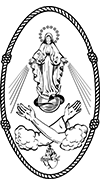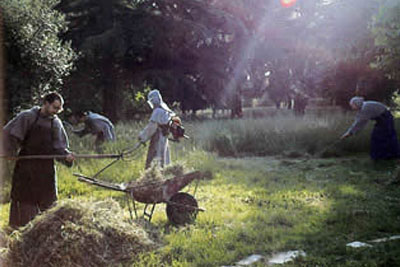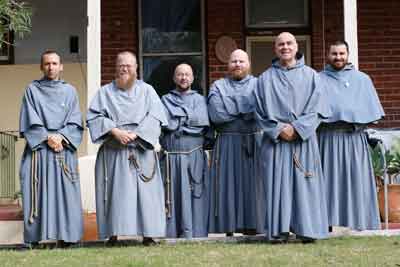Our Apostolic Work
“For Her let us live, toil, suffer, and long to die.” – St. Maximilian“For Her let us live, toil, suffer, and long to die.” – St. Maximilian
Two features govern all of our apostolic activity: it should be Marian and, as befits the Ordo Minor, it should be lesser. The first of these qualities, essential to a Marian community, must render Marian all apostolic activity according to the wonderful example of St. Maximilian Mary Kolbe (1898-1941), whom Pope Paul VI ranked “among the great saints and prophetic spirits who grasped, venerated, and sung the mystery of Mary.”
“In the bosom of the Immaculate the soul is reborn according to the likeness of Jesus Christ.” (St. Maximilian)
By virtue of our vow of unlimited and total consecration to the Blessed Virgin Mary, it is our mission and duty to give Mary to souls, to cause them to discover and know Her, to make all hearts love Her, using every means in order that She may bring souls to Jesus and transform them into other Christs “in the swiftest, surest, most beautiful way.” (St. Maximilian) St. Maximilian wrote:
“We have one freely chosen and beloved, fixed ideal … it is the Immaculate. For Her let us live, toil, suffer, and long to die.”
Like Niepokalanow, the Franciscan Friars of the Immaculate are marked by this distinctive endeavor: “to take pains, under the Immaculate Virgin’s protection and through Her mediation, to convert souls and make them holy,” by every licit means and animated by a missionary spirit that preconceives no restrictions to time or place. The other quality, the preservation of a “lesser-ness” makes us “subject to everybody.” And thus our priestly ministry will always be subject to the will of the local Bishop and his pastors. It was St. Francis’ idea to practice an auxiliary apostolate in service to the pastors of the Church. To safeguard this complete availability for unrestricted service to the clergy, we take precautions not to accept as an apostolate any fixed operations (schools, colleges, etc.) or “to be the last to take them” (by way of exception or when such a charge is urged upon us). This quality of “lesserness” colors our apostolic works, which give preference to serving the poor and humble and most needy, in a ministry of “love for souls and a fondness for assisting them, whether it be in a group to be served by good, popular sermons, or an individual, particularly in the ministry of confession and spiritual direction–always so necessary.” (Pope Paul VI) Indeed, “lesserness” constitutes the most concrete expression of our poverty and penance, which are animated by that ceaseless prayer for the fruitfulness of the priestly ministry. “I have experienced,” wrote St. Maximilian, “that only prayer obtains the grace of conversion;” and as he says elsewhere, “All the fruit of our labors directed to the conversion and sanctification of souls depends on prayer.” Prayer enables us to keep receiving the maternal care of the Immaculate Heart.





